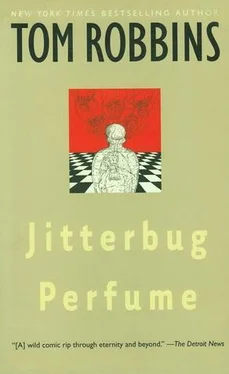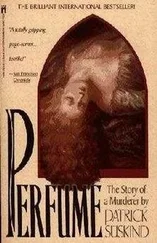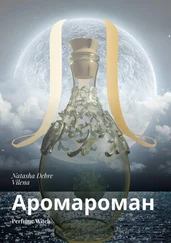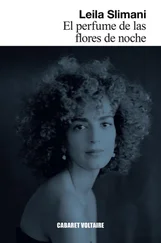The arrangement was acceptable to Alobar, who intuited that the one-eyed Irish drug maniac would be better company than the blue-collar sister-raper with whom he had previously been bunking. Although Alobar never trusted Wiggs completely (Wiggs was open and eccentric in ways the more closed and conservative Alobar found unsettling), the pair slowly, gradually became such friends that Alobar told him his life story. All thousand years of it. Everything.
Well, not quite everything. He told Wiggs more than he had told Albert Einstein. He told him of exploits in Asia, adventures in French Canada (when Pan, half-mad from the lingering effects of K23 , was still close by), which even the reader of these pages has not been told. He told him, more than once, of the perfume that was so strangely significant in his life. But he never told him how to make the perfume.
He told him almost how to make the perfume. He told him of the jasmine theme, the citric top note, and how he had finally discovered the great elusive and startling base note of beet. Ah, but Alobar, the fox, left something out. He said “beet” to his bunky, but he did not say “beet pollen.” If he had, things would have gone differently for several people that we know.
What's more, Alobar forced Wiggs to swear upon his mother's grave, his wife's knickers, the Book of Kells , the fairy hills of County Dublin, his one good eye, and everything else that he held holy, including whiskey, vision root, the true universe, Huxley Anne's future happiness, and the Salmon That Fed on the Nine Hazel Nuts of Poetic Art, that he would never ever mention to anyone that beet was the secret ingredient in an allegedly unique and wonderful perfume.
Therefore, Wiggs kept the word beet to himself, fine and private, despite his sensitivity to Priscilla's burning curiosity about the comettailed vegetable that had extended its crimson orbit into her atmosphere. He did, however, tell her the rest of Alobar's life story. Rather, he told her the highlights of Alobar's life story, for to tell the whole of it would have taken months. As it was, it took a full two hours, what with Pris getting up twice to pee, and Wiggs tiptoeing upstairs three times to check on Huxley Anne.
By the end of the story, Dr. Morgenstern had long since ceased his immortalist jitterbug, the fire was out, the windowpanes nearly dry — and Priscilla was practically faint from the knowledge that she was in possession of the ancient bottle that had held the Kudra-baiting, Pan-deodorizing K23 .
Finding herself stunned and upended by that knowledge, like a myopic houseguest who has walked into a patio door, Pris groped for sturdy furniture with which to right herself. “But—” she said, “but if they really truly did live all that time, all those centuries. . I mean, how? It's medically impossible, isn't it? How could they have done it?” She was stalling. She wasn't prepared to talk about the bottle just yet.
“Medically impossible 'tis not. Humanly impossible 'tis not. Can it be done? ye ask. Does koala-beer poop smell like cough drops?”
Wiggs then went on, applying an occasional rat-a-tat to the shamrock, to explain Alobar and Kudra's program and how it was based upon the Four Elements. He took each element in turn and did a little number with it.
AIR
“We relate to air through the breath. Most of us don't breathe properly, which is to say, we take in too little or too much and fail to consume it efficiently. Alobar and Kudra developed a method o' breathin' whereby the inhale and exhale were connected in an uninterrupted rhythm, a continuous, circular, flywheel pattern like a serpent swallowin' its own tail. Their breathin' was deep and smooth and regular. When they brought air into their bodies, they visualized suckin' in as much energy and vitality as possible; when they expelled air, they visualized blowin' out all the staleness and flatness inside o' them.
“Simple, 'tis true, but hardly simplistic when we understand that much o' the cellular damage that leads to tissue breakdown — agin', in other words — is caused by the accumulation in our bodies o' the toxic by-products o' metabolizin' oxygen. Superoxide free radicals, which is what these garbage molecules are called, combine with fatty acids to produce lipofuscin, which is an unstable, repulsive gunk that clogs up a cell like grease clogs a drain. The more goop ye have gummin' up your cells, the greater the strain on your metabolism, and the more taxed the metabolism the easier 'tis for still more poisons to accumulate.
“Biological studies have proven that the animals with the longest life spans are those with the lowest rates per body weight of oxygen consumption, apparently because they dump fewer superoxide free radicals in their cells. Since we're stuck with havin' to breathe oxygen until somethin' better comes along — laughin' gas is me own nomination, but so far Nature's not seen fit to make the improvement — we need to learn to consume less of it and to burn it more efficiently. Sure and that is precisely what your couple, oblivious though they were to the putrid perils o' lipofuscin, succeeded in doin'.
“Proper breathin', in addition, reduces stress, and stress is a major contributor to agin', disease, and death. Alobar had been introduced to the virtues o' slow, relaxed breathin' at Samye lamasery. 'The lungs are not plow yaks,' the lamas said, 'so do not drive them. Neither are they potting sheds, so keep them free of cobwebs.' What the Bandaloop 'told' him, on the other hand, is impossible to translate, but 'tis obvious, 'tisn't it, darlin', that if a serpent of air is to swallow its tail — thereby perpetuatin' the circle o' life — it must be flexible, not tense.”
WATER
“Water, too, is helpful in alleviatin' stress. How many bloomin' times have ye heard, 'Why don't ye get into a nice hot bath and relax?' Sure, but relaxation may not o' been the primary result of Alobar and Kudra's bathin' rituals, nor was the psychological benefit o' ceremonial purification the main thing, although neither should be underestimated for their effect in promotin' salubrious longevity. O' greater benefit may have been the ability o' the bathin' ceremony to lower blood temperature.
“Research at Purdue University, the UCLA Medical Center, and other lovely places has demonstrated that agin' can be forced into the slow lane, if not off the road altogether, by decreasin' the body's temperature. Hypothermia not only slows down the metabolic pump, allowin' it to coast a bit and refresh itself, it puts a lid on the autoimmune reactions that contribute to an organism's deterioration. You see, darlin', our immune systems tend to be trigger-happy, especially at high or 'normal' temperatures, frequently attacking the very cells they hired on to defend — not unlike your police department or your FBI. When body temperature is depressed, the immunological cops remain in the station house playin' checkers, respondin' with their pistols, tear gas, and billy clubs only to genuinely threatenin' situations. The wear and tear this saves on the body is the difference between a cherry and a beater.
“Now, being European, Alobar was less than an enthusiastic participant when Kudra discovered a thermal spring in one o' the caves, but gradually he came to appreciate the contribution o' the bath to their program. Their procedure was to soak for a half-hour or so, then withdraw to shade for a quarter-hour, repeatin' the process four or five times. The hot water caused their blood to rise to the skin surface, where, once they left the tub, it was in a position to be rapidly cooled. Ye understand? Over a period of centuries, this regular cooling down o' the blood may well have reset their internal thermostats — their hypothalamuses — so that they registered permanently two or three degrees below borin'—and debilitatin'—old ninety-eight point six. In Concord, alas, I never got a chance to take your man's temperature.
Читать дальше












